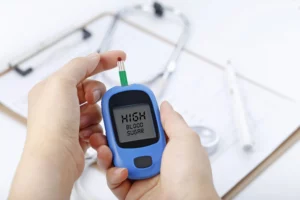Living with high blood sugar levels can be challenging and potentially harmful to your health. Whether you have been recently diagnosed or have been managing diabetes for years, keeping your blood sugar levels in check is crucial. In this blog post, we will delve into effective treatment options for managing a blood sugar level of 400 mg/dL.
Contents
Understanding High Blood Sugar Levels

High blood sugar levels, also known as hyperglycemia, occur when there is an excessive amount of glucose (sugar) circulating in the bloodstream. Glucose is the primary source of energy for cells in the body, and it comes from the foods we eat, particularly carbohydrates. However, for glucose to enter cells and be used for energy, insulin, a hormone produced by the pancreas, is required.
Long-term complications of uncontrolled high blood sugar levels include:
- Cardiovascular Disease: Chronic hyperglycemia can damage blood vessels and increase the risk of heart disease, stroke, and peripheral artery disease.
- Neuropathy: Elevated blood sugar levels can damage nerves throughout the body, leading to neuropathy, which can cause pain, tingling, numbness, or weakness, particularly in the extremities.
- Nephropathy: High blood sugar levels can damage the kidneys over time, leading to diabetic nephropathy, a condition characterized by decreased kidney function and an increased risk of kidney failure.
- Retinopathy: Chronic hyperglycemia can damage the blood vessels in the retina, leading to diabetic retinopathy, a leading cause of blindness in adults.
- Peripheral Artery Disease (PAD): Elevated blood sugar levels can lead to reduced blood flow to the limbs, increasing the risk of PAD, which can cause leg pain, slow wound healing, and in severe cases, gangrene and amputation.
Reasons For 400 Sugar Level (High Blod Sugar Levels)
A blood sugar level of 400 mg/dL (milligrams per deciliter) is considered extremely high and requires immediate attention. Several factors can contribute to such elevated blood sugar levels, including:
- Diabetes Mellitus: Uncontrolled diabetes is one of the most common causes of high blood sugar levels. In type 1 diabetes, the immune system mistakenly attacks and destroys the insulin-producing cells in the pancreas, leading to a lack of insulin production. In type 2 diabetes, the body either doesn’t produce enough insulin or becomes resistant to the effects of insulin. Without sufficient insulin, glucose cannot enter cells effectively, causing it to accumulate in the bloodstream.
- Insulin Resistance: Insulin resistance occurs when cells in the body become less responsive to the effects of insulin. This condition is commonly associated with type 2 diabetes but can also occur in individuals without diabetes, particularly those who are overweight or obese. Insulin resistance prevents glucose from entering cells, leading to elevated blood sugar levels.
- Inadequate Insulin Dosage or Administration: For individuals with diabetes who require insulin therapy, factors such as incorrect dosage, improper administration technique, or missed insulin doses can result in high blood sugar levels. Insufficient insulin levels prevent glucose from being utilized by cells, leading to hyperglycemia.
- Dietary Factors: Consuming excessive amounts of carbohydrates, particularly refined sugars and high-glycemic-index foods, can cause a rapid increase in blood sugar levels. Meals high in carbohydrates can overwhelm the body’s ability to produce or utilize insulin, resulting in elevated blood sugar levels. Additionally, irregular eating patterns or consuming large meals can contribute to hyperglycemia.
- Stress: Stress triggers the release of stress hormones such as cortisol and adrenaline, which can raise blood sugar levels. Chronic stress can lead to increased insulin resistance and impaired glucose regulation, contributing to hyperglycemia.
- Hormonal Changes: Hormonal fluctuations, such as those occurring during puberty, pregnancy, or menopause, can affect insulin sensitivity and glucose regulation, potentially leading to high blood sugar levels.
- Other Medical Conditions: Certain medical conditions, such as pancreatitis, Cushing’s syndrome, acromegaly, and hyperthyroidism, can affect insulin production or action, leading to hyperglycemia.
400 Sugar-Level Treatment Options
When dealing with a blood sugar level as high as 400 mg/dL, prompt and comprehensive treatment is essential to prevent complications and bring glucose levels back into a safe range. Here are some treatment options:
How To Get 400 Sugar Level Treatment?
If you are experiencing a blood sugar level of 400 mg/dL or higher, it’s crucial to seek immediate medical attention. Here are steps to get treatment for high blood sugar levels:
- Contact Healthcare Provider: If you have a healthcare provider or diabetes care team, contact them immediately to inform them of your elevated blood sugar levels. They can guide what steps to take next and may advise you to come in for an urgent appointment or go to the emergency room, depending on the severity of your symptoms.
- Emergency Room Visit: If you are experiencing symptoms such as excessive thirst, frequent urination, fatigue, nausea, vomiting, or difficulty breathing, it’s important to go to the nearest emergency room for immediate evaluation and treatment. High blood sugar levels can lead to serious complications such as diabetic ketoacidosis (DKA) or hyperosmolar hyperglycemic state (HHS), which require urgent medical attention.
- Immediate Treatment: Upon arrival at the emergency room or urgent care center, healthcare providers will assess your condition, measure your blood sugar levels, and initiate treatment to lower your blood sugar levels. This may involve administering rapid-acting insulin, intravenous fluids, and electrolyte replacement therapy to restore hydration and correct any imbalances caused by high blood sugar levels.
- Collaborative Care: Your healthcare provider will work with you to develop a comprehensive treatment plan to manage your high blood sugar levels effectively. This may include adjustments to your insulin regimen, dietary modifications, medication changes, and lifestyle interventions such as exercise and stress management techniques. Regular follow-up appointments will be scheduled to monitor your progress, assess blood sugar control, and make any necessary adjustments to your treatment plan.
Conclusion
In conclusion, a blood sugar level of 400 mg/dL or higher requires immediate attention and comprehensive treatment to prevent complications and restore health. High blood sugar levels can lead to serious complications such as diabetic ketoacidosis (DKA) or hyperosmolar hyperglycemic state (HHS),
It’s important for individuals with diabetes or those experiencing high blood sugar levels to be proactive about their health and seek help when needed. Regular monitoring, adherence to treatment plans, and lifestyle modifications are key components of effectively managing blood sugar levels and promoting overall well-being.
Do you want to get rid of diabetes? Join our online diabetes treatment program and reverse Diabetes naturally through lifestyle changes such as a Personalized Diet plan, Exercise, Yoga, dieticians, and health coaches.




